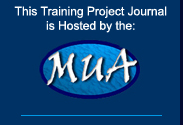
UNESCO Training Project Journal
1 June 2008
By Amer Khan
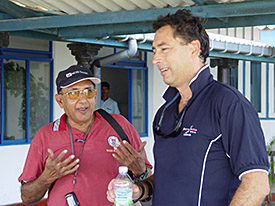
Andy and Dr. Ranjit discussing field activities. (Photo courtesy of the Central Cultural Fund).
Itís a Wrap
The UNESCO training-of-trainers field school has finally come to an end. The field school proved to be an intensive and challenging experience for everyone involved. All participants worked very hard to complete the requirements of the programme in the limited time available to them. Given their varied professional backgrounds it was very impressive to see the participants work together as a team and assist each other in reaching their collective goals. Given the collaborative nature of field archaeology this proved to be one of the many positive outcomes of the training program.
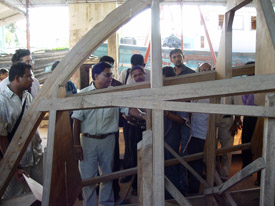
Participants visiting the local boat construction facility in Galle. (Photo courtesy of the Central Cultural Fund).
The field school consisted of an initial week of lectures and workshops followed by almost two weeks of field work. The lectures covered a range of topics designed to address the development of priority areas for the participants, and their teaching skills as future trainers. The topics included site survey techniques, ship construction, GIS, data analysis and in situ conservation. The lectures were accompanied by workshops on formal methods in ship recording, total station usage for inter-tidal site recording and practical strategies for running field training programmes. The participants went on a number of field visits during the course of the programme, including a trip to a local boat construction facility in Galle to study local vessel design and construction techniques. They also visited a modern container vessel to note persistent patterns in ship construction and contemporary innovations in maritime technology.
The field component of the training programme required the participants to structure themselves into three teams, with two dive teams and one non-diving team. The non-diving team focused on the recording and documentation of local maritime collections and conservation laboratory procedures. The dive teams in the meantime investigated two underwater shipwreck sites in the close vicinity of Hikkaduwa. The objectives of the field sessions were to review practical strategies of underwater survey, to emphasise the need for health and safety procedures in repetitive diving scenarios and to encourage collaborative approaches to problem solving. The field sessions were also intended to provide guidance on the selection of specific individuals to lead the regional training programmes to follow.
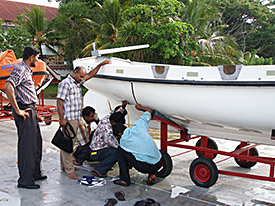
Taking the lines off a small cutter. View large. (Photo courtesy of the Central Cultural Fund).
The participants were required to keep field notebooks as standard field practice. They were assessed on their active field participation, with each individual given the opportunity to take leadership of a team, define team objectives and manage specific roles of team members. All future trainers were also required to develop and deliver presentations to demonstrate their ease and comfort with a lecturing format. Participants produced individual reports to demonstrate their proficiency for coherent content development and analysis, where as team-reports based on the field surveys were collaboratively developed to emphasize data management and report writing requirements.
Needless to say all the participants were very busy during the few weeks of the field school. While the entire programme lasted from the 20th of March to the 8th of April, this journal tracked the field work component from the 26th of March to the 6th of April. We hope that it has provided its readership with some insight into the development activities of the future trainers of the UNESCO regional training programme. I would like to forward a very special thank you to Alok, Andy and Nerina, who helped develop and deliver this training programme. Further contributions from Lt. Cmdr Somasiri Devendra, Dr. Mohan Abeyrathne, and Dr. Ranjit De Silva were very much appreciated.
While this is the end of the current training-of-trainers programme it is only a prelude to the regional training programmes to follow later in the year. In October of 2008 the first regional training programme will begin and it is hoped that many of the participants in this field school will be available to lead that initiative.
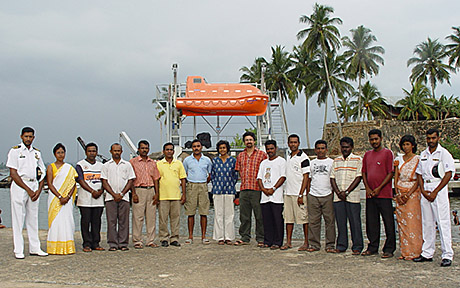
Group photo of the trainers and participants. Large view. (Photo courtesy of the Central Cultural Fund).
Comments, questions, or suggestions?
For field school related issues please contact: amer.khan@flinders.edu.au
For website related issues please contact:
mua@keimaps.com
Return to Project Journal home page.
